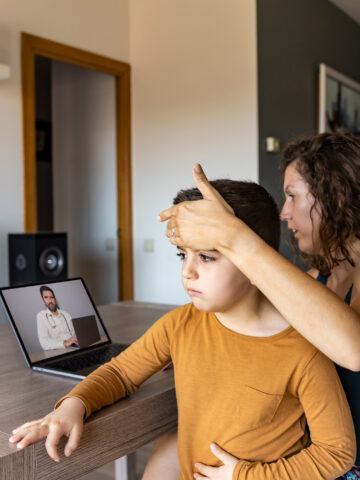Many people talk about the “stomach flu” when they’re feeling sick to their stomachs. It isn’t the same as influenza or the flu. Stomach flu is an illness called gastroenteritis, which is usually caused by a virus. The seasonal flu, or influenza, is a virus in the upper respiratory system. Each year from October to May, millions of people all across the U.S. come down with the flu.
Stomach flu (gastroenteritis)
Someone with the stomach flu may have the following symptoms:
- Stomach cramps
- Diarrhea
- Fever
- Nausea
- Vomiting
He or she will usually feel sick for a day or two and then feel better. Unfortunately, there is no vaccine or cure for the stomach flu or gastroenteritis. Here’s how you can make the stomach flu go away:
- Get lots of rest
- If you’re throwing up, avoid solid food. When you feel up for reintroducing food, start with bland items like bananas, rice, applesauce or toast.
- Sip fluids, such as water, or try a popsicle.
- To avoid dehydration, sip small amounts of beverages that contain electrolytes.
Seasonal flu (influenza)
When people have influenza, they usually feel worse than they do with a cold. Most people start to feel sick about two days after they come in contact with the flu virus. They might have:
- Fever
- Chills
- Headache
- Muscle aches
- Dizziness
- Loss of appetite
- Tiredness
- Cough
- Sore throat
- Runny nose
- Nausea or vomiting
- Weakness
- Ear pain
- Diarrhea
Sometimes, influenza can turn into pneumonia. This is especially dangerous for babies, or kids and adults with pre-existing health conditions. If you think your child has influenza, see a doctor.
How to treat the flu
Most kids with influenza will get better at home. Make sure your child:
- Drinks plenty of fluids
- Gets plenty of sleep
- Takes acetaminophen or ibuprofen to relieve fever and aches.
- Wears layers that are easy to remove. Children might feel cold one minute and hot the next.
Fever and most other flu symptoms often go away in about five days, but kids may experience a lingering cough or feel weak. Children should be kept home from school or daycare until they have been fever-free for 24 hours.
Tips for keeping your kids safe from the seasonal flu:
There are several things you can do to help your family avoid the seasonal flu.
- Get a flu shot. It’s better to get vaccinated later in the season than not at all. The Centers for Disease Control recommends annual influenza vaccinations for everyone 6 months and older.
- Practice proper hand washing. Besides getting a flu shot, proper hand-washing is the best way to prevent the spread of illness, including the seasonal flu.
- Stay away from people who have a fever. Ask friends, family and caregivers who have had a fever or chills within the past 24 hours to stay away from your child. Likewise, keep your little ones home from school or daycare for 24 hours after they’ve had the same symptoms.






